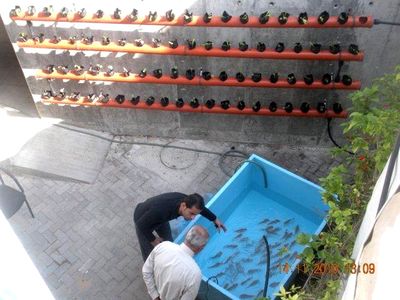Abu Ahmed looks out over a sea of grey, empty Gaza rooftops, and smiles as he looks back at the lush greenery sprouting in tubs and pipes on top of his apartment building.
He is part of a United Nations agency project to introduce cutting-edge urban agriculture to Gaza City, teaching Palestinians to farm without soil in the space available to them in one of the world’s most densely populated places.
Most of his rooftop is given over to an aquaponic system, which produces food by linking fish tanks of tilapia with gravel-filled planters.
The integrated system feeds the water from the fish tanks into the plant beds, where Abu Ahmed’s crops – lettuce, peppers, broccoli, celery and herbs — are fertilised by waste produced by the tilapia.
As the water trickles through the gravel, the plants absorb nutrients from the fish waste, cleaning the water, which then replenishes the tanks.
“The idea really was to help the poorest people in Gaza be able to grow some of their own food, and healthy food, grown without pesticides,” explains Mohammed El Shatali, the project’s deputy manager.
For Abu Ahmed, the project has been a major success.
In Gaza’s main towns and cities, empty land is being eaten up by the construction of multi-storey apartment buildings, leaving little space for agriculture.
The challenges prompted the UN’s Food and Agriculture Organisation (FAO) to look for new ways to maximise crop production in tiny spaces.
In Gaza City’s Zeitun neighbourhood, 34-year-old Eman Nofal tends crops in a small yard next to her apartment. Peppers have been her biggest success this year, and both sweet and spicy red peppers dot the greenery in her planters.
The project has faced setbacks, including the Gaza-specific challenge of power cuts of up to 12 hours a day, which shut down the pumps that transfer water between the fish tanks and plant beds.
“Electricity has been one of the most difficult challenges,” says Chris Somerville, an urban agriculture consultant with the FAO.
“At 30 degrees centigrade (86 Fahrenheit), the capacity of the water to hold oxygen reduces, and during the summer many of the beneficiaries had fish die.”
New participants will receive a battery-powered pump to tide them over during power cuts, and the FAO is experimenting with fibres that could be used in hydroponic systems to retain moisture when power cuts stop the water flow.
Initially, the project also had to overcome a certain level of scepticism, Somerville says.
“To tell agrarian societies that you’re going to grow plants without soil can sometimes be a bit of a jump,” he laughs.
But the project has been so successful that the next cycle will expand from 15 aquaponic participants to around 80, with another 80 homes operating hydroponic systems.
It will be the first time the FAO has implemented aquaponics on this scale, and the agency is now looking at implementing the project elsewhere in the world.
To be able to take this Gaza model and bring it to other countries would really be a massive achievement,” Somerville says,according to Gaza news.

